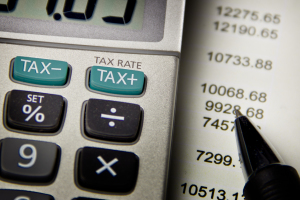
Image by Ken Teegardin via Flickr Creative Commons
Many investments, including stocks and bonds, are subject to taxes above and beyond the simple income tax; rental property ownership, on the other hand, can deliver some amazing tax breaks for landlords. While the tax benefits alone are no reason to run out and buy up rental properties, they're worth considering when researching investment options and important for landlords to keep track of.
For anyone who's a current or prospective property owner, let's start right out with the all-important disclaimer: Consult an accounting professional about these and other tax ramifications of rental property ownership.
With that out of the way, here are the 13 key tax benefits for rental property owners:
1. Repairs: Repairs you make to your rental property are generally deductible in the year they're expensed. Larger projects classified as "improvements" might need to be depreciated rather than deducted, so check with that accountant. Every minor or major plumbing, heating, electrical or carpentry repair could be a deductible expense.
2. Interest expense: Mortgage interest is usually the single largest deduction landlords can take, but it's not the only type of interest deduction. You can also deduct home improvement loan interest and even credit card interest for property-related expenses.
3. Depreciation: This deduction is like a gift of cash off your tax bill, because you don't actually spend any money in order to receive it. Check out the IRS publication here for details, but you can deduct a portion of the structure's cost each year as depreciation (the value of the land is not depreciable).
4. Marketing: Whether you advertise your property in local newspapers or magazines or pay to place it on a rental property website, every paid ad you run for tenants is a deductible expense.
5. Travel expenses: As long as the travel was related to rental property activity, both local and long distance count toward this deduction. Typical travel expenses might include:
- Meeting a prospective tenant for a showing
- Driving around doing market research or checking out homes for purchase
- Attending a landlord seminar or course for rental investing - check with your accountant for advice on which hotel, airfare, car or other expenses you can deduct and how to prove them
- Trips to the hardware store for materials
6. Independent contractor expenses: You may be hiring landscapers, painters or exterior cleaners as independent contractors. You can deduct what you pay them.
7. Employee expenses: If you hire someone as an employee – as opposed to a contractor – to do maintenance or management tasks, you can deduct their wages and related benefits against income.
8. Insurance: You must insure your investment, and if it's mortgaged, your lender will require it as well. Insurance premiums are deductible – this includes liability, casualty and any other insurance related to the rental property.
9. Local property taxes: Real estate taxes are everywhere, but you can deduct the county, city and school taxes you pay on the rental property.
10. Theft and casualty losses: Break-ins or property damage from criminal activity or even acts of nature are normally totally deductible. Of course, this is only for expenses outside of insurance coverage, which would include deductibles paid on a claim.
11. Legal, accounting and management services: You may be hiring professionals in any of these disciplines, and what you pay them is deductible in the year expensed. If you hire a management company to handle all of the headaches of rental property ownership and tenant relations, Uncle Sam will pay a share of it through a deduction.
12. Home office: If you designate a portion of your home as an office for management of your rental property and real estate business, you can deduct certain expenses related to that space. Consult your accountant, as there are specific rules related to this deduction, but you may be able to deduct a percentage of all costs of home ownership based on the proportion of the office size to the overall square footage of the home.
13. Offset other investment income: In certain cases, losses from a rental property can be used to offset income from other investments. Why would you lose money? If your depreciation deduction is substantial, it can wipe out a lot of real income without you spending any extra money. You may be enjoying a great positive cash flow, but combining mortgage interest and depreciation you could show a paper loss. Again, check with your accountant to see if this deduction applies to you.
This baker's dozen of rental property tax breaks can add up to big savings at tax time and make your investment even more profitable. Work with your tax preparer to see how you can take advantage of these beneficial deductions for rental property owners.
